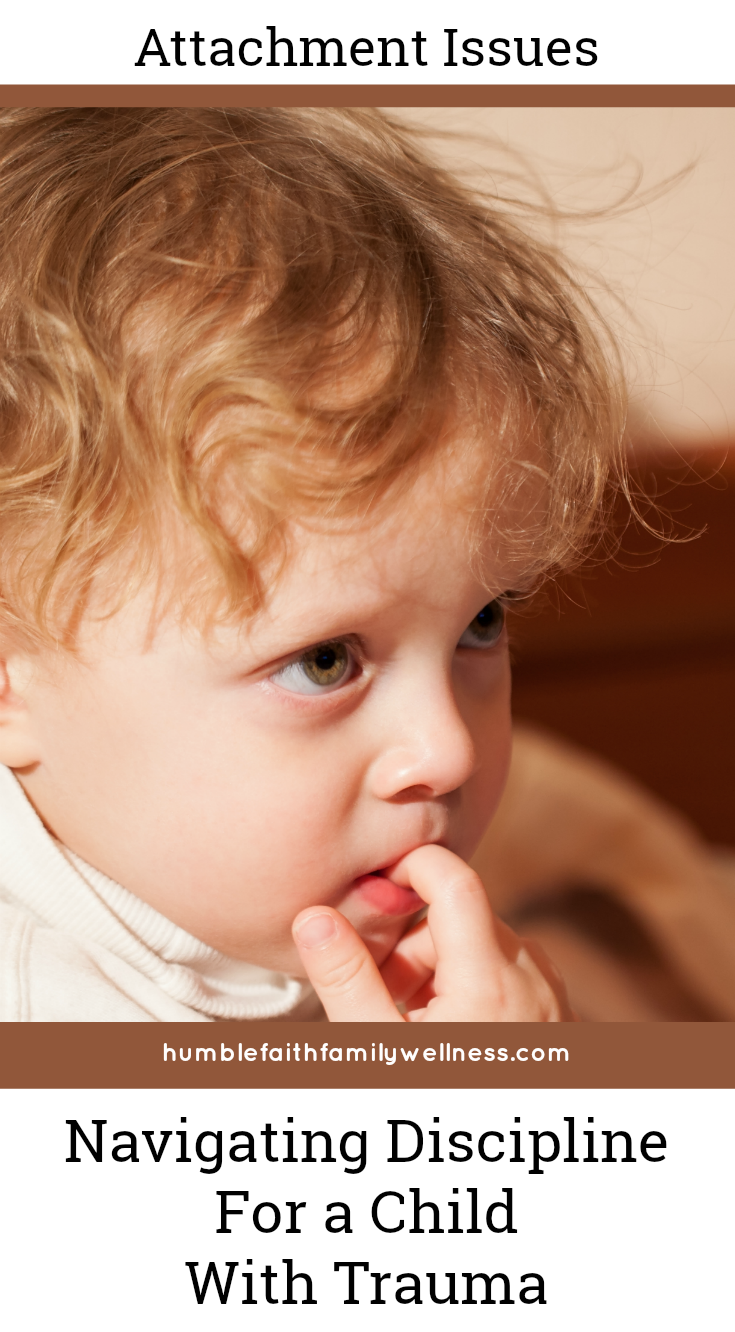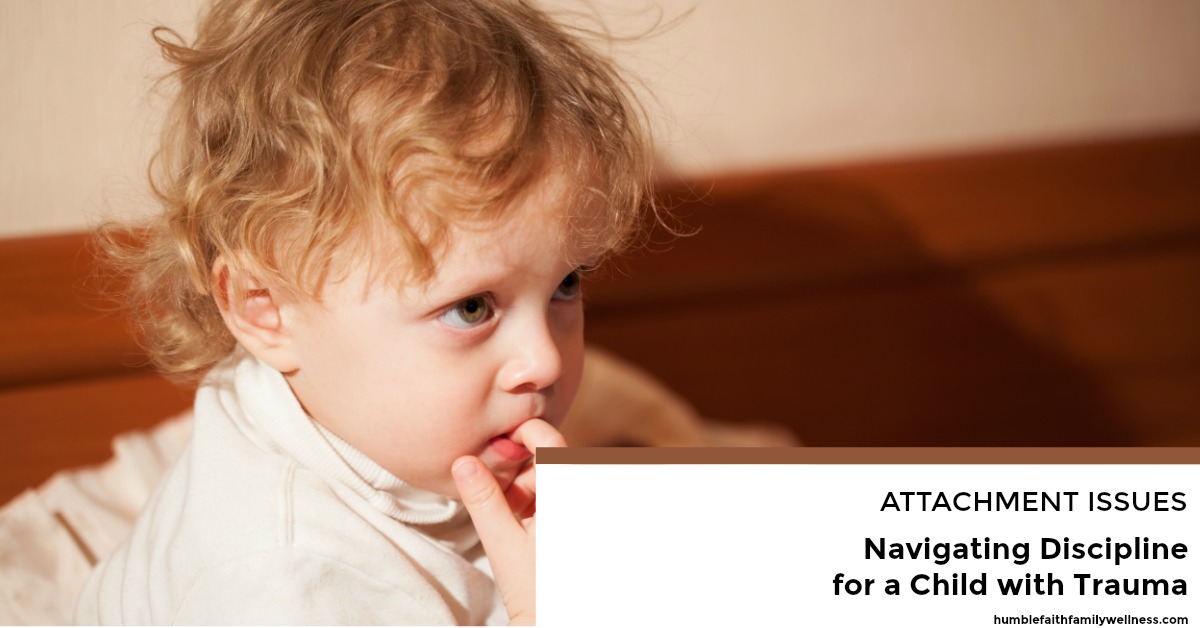
*This post may contain affiliates. Read the full disclosure here.
Discipline is a difficult topic in the best of parenting situations. Everyone has an opinion on what to do and how to do it. When we add trauma to the equation, the waters get a whole lot muddier.
I’m a mental health therapist having working with traumatized and abused children and families for eight years. One thing I can tell you this there is no “one way” to discipline a child who has endured trauma. (There is no “one way” for any child for that matter.)
Your child is unique. Their trauma history and story is unique. So I caution you to not hold too tight to any source that touts having the magic formula to heal, fix, or change your child if only you follow their way to a T.
You will become tremendously frustrated and so will your child.
It is also likely that your child is going to need different discipline strategies as time goes on and as they grow, change, and progress. Just like any other child. I don’t say that to make the situation feel all the more overwhelming but rather as a reminder that this is a process.
So my hope is to offer some guidelines that I have found to be beneficial for the clients I have worked with. We work with these five principles but then make them specific to their child and situation.
Support Your Child
First and foremost be consistent in expressing your commitment and love for your child no matter what they are doing or saying. They have not known unconditional love prior to your home.
[ctt template=”7″ link=”3dfqJ” via=”yes” ]First and foremost be consistent in expressing your commitment and love for your child no matter what they are doing or saying.[/ctt]
Your child’s negative behavior can come from multiple places – dysregulation, having been triggered, lack of food/sleep, transition time, control, willful/purposeful disobedience and/or to test you.
And the hard part is that your child may or may not actually have any insight into which of the above is why their behavior happened. This is all the more reason why they need you. Even if they don’t realize it or actively try to push against you.
(This is a large part of my work with parents – helping them find patterns and triggers to their child’s behaviors. This can help to regulate, alter, and shift environmental situations when a child may not be able to.)
You are to be their rock. Their steady. Roots firmly planted in messages of love and stability.
Ways to offer support and phrases to say:
- Offer physical touch in whatever way your child is comfortable with and that is good boundaries.
- “I love you.”
- “We’ll get through this together.”
- “You are important to me.”
- “I won’t give up on you.”
- “You can share whatever you want with me.”
- “I want you here.”
To find out the other four principles – follow me over to Lindsey Zitzmann’s site – Loving the Wounded Child
To understand more about attachment issues I recommend starting out with this post.
God bless!
Melissa
p.s. Checkout all of the beautiful sites I linkup with.

It must be hard to get a child to trust when that trust has been shattered in the past. It seems like the distrust would be instinctual until there is some way to verify over years that there is someone who is actually physically safe to be with.
Unfortunately, yes. The process of trust and experiencing safety is a long one. It has it’s ups and downs. Forward progress and two steps backward. But the calling is to love our children (from all circumstances) unconditionally. Thank you for stopping by and sharing your thoughts. God bless!
Love this! There is no one way to raise any child, but your suggestions for supporting them are fabulous.
Thank you Heather. I really cringe when I see books, posts, or articles on “Do this…” or “This one discipline tool will…” It preys on the emotions of parents trying to do what is best for their children. Thank you for stopping by and reading. God bless!
Thank you for sharing that every child is unique and the situation is unique. I think that is most frustrating to parents, we want to try what other’s have found successful and yet for our child it doesn’t work. Having a bunch of different resources is so helpful!
It can be really frustrating. Or when a different assumes that if you try their parenting approach things will be all better. Blanket parenting advice rarely works. Thank you for stopping by and sharing your thoughts. God bless!
So helpful with these suggestions. I have several people I will pass this along to. Discipline is a whole different thing with children who have undergone trauma.
I’m glad you found the post beneficial, Alice. Yes, discipline is very different and takes more intentional thought for children who have endured trauma. Thank you for stopping by and for passing the article along. God bless!
As you mentioned discipline is a hard subject, our children were all so different and what worked for one did not work for the others. Add in a traumatic experience and it would be so much harder. Thank you for your expertise and help that you give parents.
Thank you Kathleen! Yes, it is a hard topic and one that creates much frustration for the parents and the child. Thank you for stopping by and sharing your thoughts. God bless!
I love this. Thank you for sharing. It can be hard to show patience in parenting. Especially when we find ourselves at our last end. Thankfully, we have a perfect example of a Father who is loving and kind, who is trustworthy and even when we have run away and rejected him opens his loving arms. May we be able to do the same!
Yes! We need to more often look to His example on how to love our children no matter how troubled and wounded they are. Thank you for stopping by and sharing your thoughts. God bless!
Melissa, to be consistent and patient and let them know you are for them is a powerful way to reach any child. And traumatized children require that in even larger helpings. Great content!
Thank you, Debbie! Yes, traumatized children need even more intentional parenting. Thank you for stopping by and commenting. God bless!
I love the affirming words you laid out as examples! Words heard over and over will stick with a person… my favorite phrase is ” We’ll get through this together!” That’s a great reminder for myself, as a parent! I will definitely pass this along to families I know, who are considering adoption and foster care. <3
Starting out with supporting the child as a person is so vital. After that the emotions and behaviors can be addressed and taught. Thank you for reading and sharing with others. God bless!